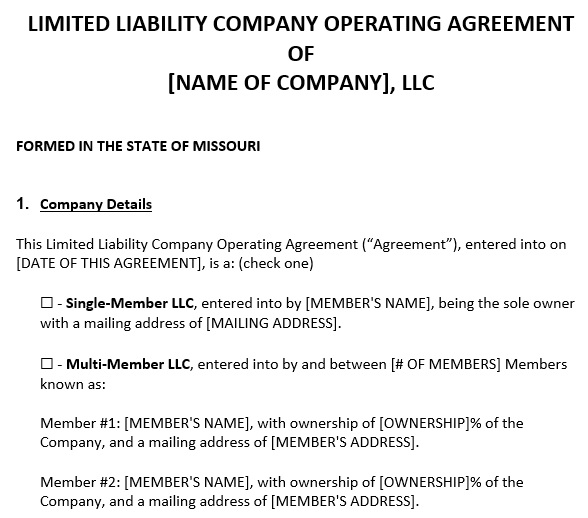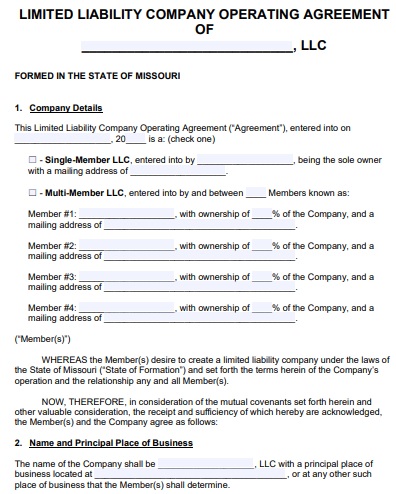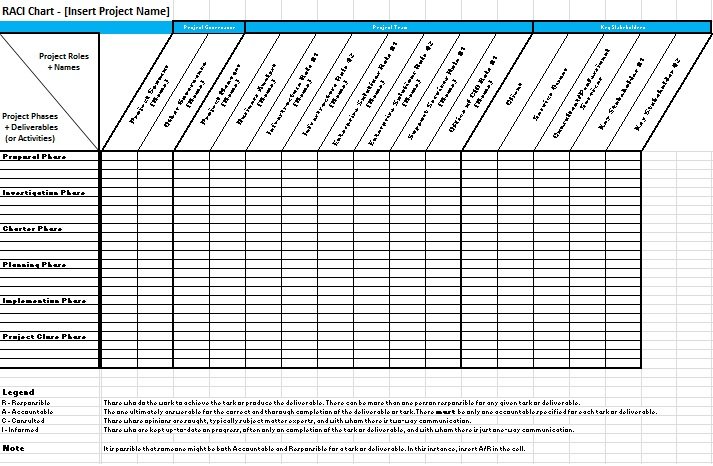A Missouri LLC operating agreement template is a legal document that specifies official procedures and the business structure. It is used to inform that how daily operations within the company are handled and how decisions like profit division, ownership distribution, duties allocation, etc., are made.
Furthermore, the member’s expectations are also highlighted by this document in terms of members’, managers’, and employees’ conduct. This agreement is also referred as a Missouri membership agreement.
Table of Contents
Why an LLC operating agreement?
In Missouri, using an operating agreement to run an LLC business is worthwhile. Let us discuss below the different ways LLCs tend to benefit from an operating agreement;
Prevent conflicts
As we know that LLC operating agreement highlights what is expected of each party that are involved in running an LLC business. The agreement contains the rules and regulations that prevents LLC members, managers, and employees from misunderstandings and conflicts. Each member’s responsibilities, roles, and expectations are clearly defined in the document to avoid confusion.
Protects LLC status
An LLC structure of business makes sure that the assets of owner are separated from the company. As an outcome, for any liability of the LLC, the LLC owner in not liable like debts. Furthermore, this agreement further increases the company’s limited liability status.
Verbal agreements
Owners have to negotiate and enter into agreements that meet every member of LLC expectations during the formation of an LLC. Operating agreements make sure that they are written down rather than making verbal agreements. Thus, making credible reference sources rather than relying on memory.
Give legitimacy
With an operating agreement, Missouri LLC businesses are more credible than those that don’t. Since credibility indicates good preparation and organization of internal affairs of an LLC so it goes a long way in cooperating with banks, creditors, and attracting investors. For instance, before an LLC company opens a bank account, an operating agreement is needed.
Required by the state
All LLCs are expected by the state of Missouri to have an LLC operating agreement whether it is single-member or multi-member, foreign LLC, or domestic LLC. This stipulation depends on the Missouri Business Statutes.
How do you form an Operating Agreement?
Here are the steps to make an effective an effective operating agreement for an LLC in Missouri when they get a business name from the secretary of state;
Find a registered agent
At first, in Missouri, the LLC members should appoint a registered agent having a valid physical address in the state. This might be any business operating or an individual with legal residence in Missouri. Legal notices, state filings, service of process, or any other documentation addressed to the LLC are received by a registered agent.
Application for registration
It is necessary that the LLC must be registered with the state. By using the Articles of Organization (for domestic LLCs) or an Application of Registration and a Certificate of Existence (for foreign LLCs), an LLC can be registered. Via mail or online, the registration can be done.
Fee
You have to pay to the state Corporations Division the applicable filing fees. This fee may vary for online applications or for mail applications.
Operating agreement
The LLC operating agreement can be made and presented to all the members for signing when the application process has been finalized. Every member should be provided a copy. This copy should be filed with company records.
EIN
The LLC should apply for an IRS Employer Identification Number in order to finalize the formation of the LLC. This is a requirement for tax purposes, paying employees, and more.
Missouri LLC Operating Agreement Template
Free Missouri LLC Operating Agreement Template
Conclusion:
In conclusion, a Missouri LLC operating agreement template is an official document that states how daily operations are handled and how decisions are made within the company. This document clearly defines the responsibilities, roles, and expectations of each member.







